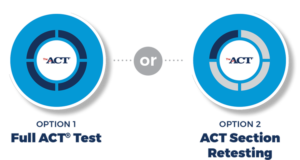How do you know what’s true and what’s just a rumor about your standardized test scores will affect your college applications? Don’t Fall for These Five Misconceptions About the SAT and ACT
- Students should take both the SAT and the ACT.
Not true. While the tests are more similar due to the recent changes to the SAT, it’s still important for students to focus studying specifically for one test. By dedicating effort toward one exam, students can become completely comfortable with that exam and the test–taking skills it requires. Plus, who wants to sit through hours and hours of test by taking each one multiple times.
- Everyone at my school takes the SAT so I should take the SAT.
Student have a choice and they should choose the test that best reflects their academic strengths.
- Colleges prefer the SAT (or ACT).
Not true! At our last check, all US colleges don’t care which test gets submitted, so students should take the test that suits them best and submit that test.
- Everything is riding on my scores.
Standardized test scores are one factor that is considered when colleges are reviewing an applicant – but they are not the most important. According to the National Association of College Admissions Counselors, college admissions officers consistently rank grades and course rigor as the most important admissions factors. So a student can have great test scores, but if his or her grades and courses aren’t up to standard, he or she may have a considerably lower chance of getting in. In fact, it can be a red flag to admissions officers if a student’s grades and test scores are wildly unmatched. That’s not to say that standardized test scores aren’t important. A score that’s too low could be the deciding factor of admission to reject that student’s application. It’s important to do well on standardized test scores, but it’s not the only thing to focus on.
- I have great grades so I’ll do well on the SAT or ACT without studying.
Ideally, by the time students are sitting for the SAT or ACT, they will have adequately covered the content and concepts being tested. However, curricula vary from school to school, and every student has different abilities. The truth is, for some students, there may be little overlap in what’s being taught in class and what’s on the test. For other students, some concepts may have been covered previously, but so much time has passed that they’ve forgotten some of the key elements. Much of the content students are tested on in the SAT or ACT is also presented in a different format, so even though they’ve covered the concepts before it may seem unfamiliar. There’s also the issue of time constraints, test-taking strategies, and other factors that don’t mimic traditional learning or the classroom experience. Just because a student performs well in class doesn’t mean he or she will do well on the ACT or SAT the first time around. A student wouldn’t go into any other test unprepared, and standardized college entrance exams are no different.
- The ACT is “easier” than the SAT.
This common myth – pitting one test against the other and even asserting that colleges value one over the other – never holds true. All colleges and universities equally consider both tests. No test is “easier” than the other. The factor that students must consider when choosing which test to take and prepare for is which one is a better fit for his or her abilities. At Sentia Education, we recommend students take a diagnostic test doe the SAT and the ACT under timed conditions to get an idea of which test they perform better on, which test they prefer and what aspects they need to prepare for.
- I don’t need to take the SAT or ACT until the spring of my junior year.
While this is the most popular time for high school students to take college entrance exams, it leaves students with little time for improvement should they not perform as they expected. Also, with finals, AP exams, extracurricular activities and challenging courses, spring of junior year can leave students stretched thin – which can hurt test prep and performance.
The truth is, many students will have covered the most frequently tested concepts on the SAT and ACT by sophomore year of high school, so for some students it can be better to take the test a little earlier if they’re ready. Through test prep sophomore year and earlier in junior year, students can get a refresher on the content they’ve already covered – allowing them to take the test earlier and have more time for adjustments. Also, they can learn test-taking strategies and tips that don’t necessarily require prior knowledge of the content.
- You can’t really improve your Reading score.
You CAN improve your Reading score by expanding your vocabulary, honing your critical reading skills, understanding the author’s point of view, and mastering your test-taking skills. So read – books, newspapers and anything else you can get your hands on. Sentia Education offers expertise on additional skill-building tools.
- Students should take the ACT only if they’re strong in science
The science section of the ACT measures a student’s ability to read charts and graphs and interpret data. There is little need for actual science knowledge to do well on science section of the ACT. Being strong in science may not translate to the ACT science section.
- You should take the SAT or ACT as often as you can.
At Sentia Education, we recommend students take the SAT only a couple of times. In place of official tests, we offer a numerous practice tests that help students and tutors identify continued challenges as well as gauge test readiness. Don’t treat the official SAT or ACT as practice. Practice tests are for practice. The real thing is the real thing.
- Since the essay is optional, you don’t need to take it.
We encourage students to take the ACT with Writing and include the SAT essay in their registration. Before making your decision, you should check the requirements of the colleges you are applying to. Many colleges either require or recommend that applicants include the essay and, if that’s the case, you definitely want to take essay portion of the test.
Even if you are not quite sure which colleges you may be applying to, it’s best to include the essay in case it is required or recommended by any of the schools you do end up applying to, especially since you cannot take the Writing section test by itself.
- I don’t have to take the subject tests
- 26 colleges recommend SAT subject tests
- 37 colleges accept SAT subject tests.
- 44 colleges require SAT subject tests.
The ACT is NOT a substitute for the SAT & SAT subject tests
- 26 colleges recommend SAT subject tests. Of these, 23 do not let the ACT replace subject tests.
- 37 colleges accept SAT subject tests. Of these, 36 do not let the ACT replace subject tests.
- 44 colleges require SAT subject tests. Of these, 25 do not let the ACT replace subject tests. (e.g. Harvard, Princeton, Georgetown, and all UC schools)
- Test prep doesn’t work.
Studies collected by FairTest show that good test prep programs can raise a student’s scores by 100 points, and in many cased, even more. Sentia Education works with each student individually to identify strengths and weaknesses in both concepts and skills as well as in strategies. A targeted approach to test preparation utilizes a student’s existing skills and helps them translate them to the standardized test format. Most of what students encounter on the ACT and SAT reflects specific math, reading, and writing skills they have already learned in school. General academic performance will, in many cases, predict performance on standardized tests. Students who have worked hard and earned A’s are in great shape to do well on the ACT or SAT.
The key to success on standardized tests is to work hard in school, and then do enough focused test prep to become completely comfortable and confident with the content and question types encountered on the ACT or SAT. There are a variety of test-taking strategies which can boost your student’s score.
The misconception comes from the fact that — in addition to explicitly testing math, reading comprehension, verbal reasoning, and writing skills — both the ACT and SAT take basic or foundational concepts and ask test-takers to apply them in ways that can seem tricky. The tests also try to measure critical thinking and problem solving ability, abstract skills that are built into all high school subjects rather than taught in a particular class.



